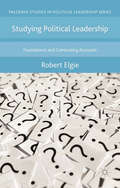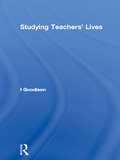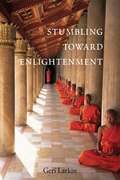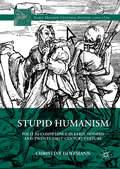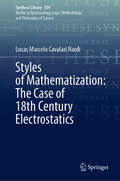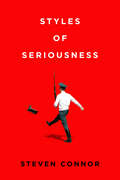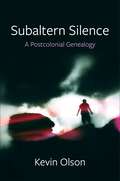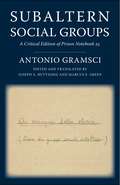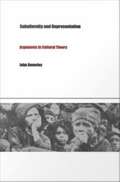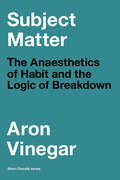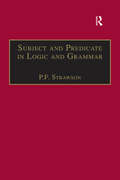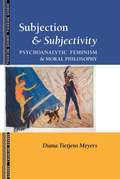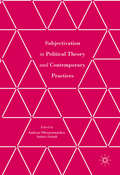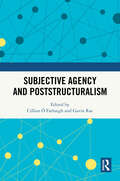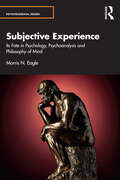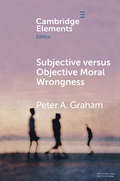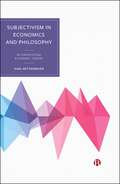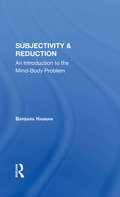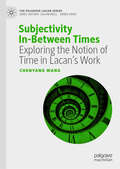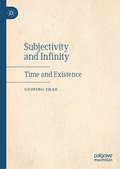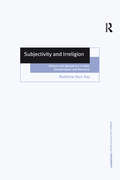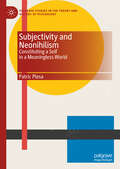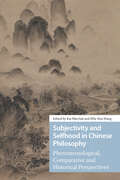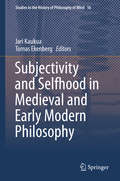- Table View
- List View
Studying Political Leadership: Foundations and Contending Accounts (Palgrave Studies in Political Leadership)
by Robert ElgieWhy are some political leaders stronger than others? How do we make sense of the interaction between the leader's personality and the context that the leader faces? This book provides a unique way of approaching these questions, identifying the very different philosophical foundations that underpin the contemporary study of political leadership.
Studying Teachers' Lives (Investigating Schooling Series #1)
by I GoodisonTo develop a mode of educational research which speaks both of and to the teacher we require more study of the lives of teachers. This book provides a vital insight into the ways in which teachers' bakgrounds and career histories affect their teaching methods and approaches. Many issues are covered ranging from the question of teacher drop-out to the importance of teacher socialisation. The studies employ a range of different methodologies allowing the reader to assess their varying strengths and weaknesses, but throughout they reaffirm the centrality of the teacher in educational research.
Stumbling Toward Enlightenment
by Geri LarkinA humorous and honest collection of Buddhist wisdom from a Western beginner's perspective. Instead of promising a straight and clear path to enlightenment, author and teacher Geri Larkin shows us that even stumbling along that path can lead to self-discovery and awakening, especially if we prize the journey and not the destination. With candor, affection, and earthy wisdom, Larkin shares her experiences as a beginning and continuing Buddhist. This spirituality classic shows any seeker that it's possible to stumble, smile, and stay Zen through it all.
Stupid Humanism
by Christine HoffmannThis book frames the undeniably copious 21st-century performances of stupidity that occur within social media as echoes of rhetorical experiments conducted by humanist writers of the Renaissance. Any historical overview of humanism will associate it with copia--abundance of expression--and the rhetorical practices essential to managing it. This book argues that stupidity was and is a synonym for copia, making the humanism of which copia is a central element an inherently stupid philosophy. A transhistorical exploration of stupidity demonstrates that not only is excess still the surest way to eloquence, but it is also just the kind of spammy, speculative undertaking to generate a more generous and inventive comprehension of human and nonhuman relationships. In chapters exploring the rhetorics of memes, attack ads, public shaming blogs, clickbait and gifs, Stupid Humanism outlines the possibilities for a humanism less invested in the normative logics that enshrine knowledge, eloquence and linear development as the chief indicators of an active, articulated selfhood and more supportive of a program for queer knowledge, trivial pursuits, anti-social ethics and the curious relationships that form around and in response to abundance of expression.
Styles of Mathematization: The Case of 18th Century Electrostatics (Synthese Library #509)
by Lucas Marcelo Cavalari NardiThis book studies the mathematization of physics, with a special emphasis on 18th century electrostatics as a case study. The mathematization of a scientific field is a fruitful yet underdeveloped topic that can be seen through different lenses. A noticeable one is the Inferential Conception proposed by Mark Colyvan and Otávio Bueno. In this regard, the use of mathematics is understood as a set of mappings relating the physical realm and the mathematical realm. However, the historical process related to the use of mathematics remains unsolved; philosophical frameworks usually have a hard time dealing with historical dimensionality. Therefore, this book provides a study of the historical process of mathematization going beyond the framework in order to explain the use of mathematics a-historically, using the aforementioned investigation of 18th century electrostatics. The research developed gravitates around two centers; the history of physics and the philosophy of science, making the book of equal importance to both historians and philosophers of science.
Styles of Seriousness
by Steven ConnorBeing serious demands serious kinds of work. In Styles of Seriousness, Steven Connor reflects on the surprisingly various ways in which a sense of the serious is made and maintained, revealing that while seriousness is the most powerful feeling, it is also the most poignantly indeterminate, perhaps because of the impossibility of being completely serious. In colloquy with philosophers such as Aristotle, Nietzsche, James, Sartre, Austin, Agamben and Sloterdijk, and writers like Shakespeare, Byron, Auden and Orwell, Connor considers the linguistic and ritual behaviors associated with different modes of seriousness: importance; intention, or ways of really "meaning things;" sincerity; solemnity; urgency; regret; warning; and ordeal. The central claim of the book is human beings are capable of taking things seriously in a way that nonhuman animals are not, for the unexpected reason that human beings are so much more versatile than most animals at not being completely serious. One always, in fact, has a choice about whether or not to take seriously something that is supposed to be so. As a consequence, seriousness depends on different kinds of formalization or stylized practice. Styles of seriousness matter, Connor shows, because human beings are incapable of simply and spontaneously existing. Being a human means having to take seriously one's style of being.
Subaltern Silence: A Postcolonial Genealogy (New Directions in Critical Theory #90)
by Kevin OlsonSubordination did not simply fade away in the aftermath of colonialism. Instead, this illuminating book shows, a host of subtle new techniques have arisen that dominate vast categories of people by rendering them silent. Kevin Olson investigates how contemporary societies silence the subaltern: sometimes a literal silencing, often a metaphor for other ways of making people unheard. Such forms of silence make some people invisible, push others to the margins, and devalue the voices and actions of still others.Subaltern Silence traces the development of these techniques to the early years of European colonialism, focusing on Haiti’s revolution and postcolonial trajectory. Exploring rich archives from Europe and the postcolonial world, Olson critiques fundamental modern institutions and technologies, such as the public sphere, the free press, and even progressively minded democratic revolution, as sites of exclusion. With the emergence of postcoloniality, he argues, subordination has become increasingly abstract, virtual, and symbolic. Nonetheless, it lies at the heart of contemporary racial politics, divides Global South from Global North, and allocates privileges and burdens in ways that are often scarcely perceptible. Engaging deeply with the thought of Gayatri Spivak and Michel Foucault, Subaltern Silence offers a new genealogy of colonialism and postcoloniality that is both historically informed and theoretically rich.
Subaltern Social Groups: A Critical Edition of Prison Notebook 25 (European Perspectives: A Series in Social Thought and Cultural Criticism)
by Antonio GramsciAntonio Gramsci is widely celebrated as the most original political thinker in Western Marxism. Among the most central aspects of his enduring intellectual legacy is the concept of subalternity. Developed in the work of scholars such as Gayatri Spivak and Ranajit Guha, subalternity has been extraordinarily influential across fields of inquiry stretching from cultural studies, literary theory, and postcolonial criticism to anthropology, sociology, criminology, and disability studies. Almost every author whose work touches upon subalterns alludes to Gramsci’s formulation of the concept. Yet Gramsci’s original writings on the topic have not yet appeared in full in English.Among his prison notebooks, Gramsci devoted a single notebook to the theme of subaltern social groups. Notebook 25, which he entitled “On the Margins of History (History of Subaltern Social Groups),” contains a series of observations on subaltern groups from ancient Rome and medieval communes to the period after the Italian Risorgimento, in addition to discussions of the state, intellectuals, the methodological criteria of historical analysis, and reflections on utopias and philosophical novels. This volume presents the first complete translation of Gramsci’s notes on the topic. In addition to a comprehensive translation of Notebook 25 along with Gramsci’s first draft and related notes on subaltern groups, it includes a critical apparatus that clarifies Gramsci’s history, culture, and sources and contextualizes these ideas against his earlier writings and letters. Subaltern Social Groups is an indispensable account of the development of one of the crucial concepts in twentieth-century thought.
Subalternity and Representation: Arguments in Cultural Theory
by John BeverleyThe term "subalternity" refers to a condition of subordination brought about by colonization or other forms of economic, social, racial, linguistic, and/or cultural dominance. Subaltern studies is, therefore, a study of power. Who has it and who does not. Who is gaining it and who is losing it. Power is intimately related to questions of representation--to which representations have cognitive authority and can secure hegemony and which do not and cannot. In this book John Beverley examines the relationship between subalternity and representation by analyzing the ways in which that relationship has been played out in the domain of Latin American studies. Dismissed by some as simply another new fashion in the critique of culture and by others as a postmarxist heresy, subaltern studies began with the work of Ranajit Guha and the South Asian Subaltern Studies collective in the 1980s. Beverley's focus on Latin America, however, is evidence of the growing province of this field. In assessing subaltern studies' purposes and methods, the potential dangers it presents, and its interactions with deconstruction, poststructuralism, cultural studies, Marxism, and political theory, Beverley builds his discussion around a single, provocative question: How can academic knowledge seek to represent the subaltern when that knowledge is itself implicated in the practices that construct the subaltern as such? In his search for answers, he grapples with a number of issues, notably the 1998 debate between David Stoll and Rigoberta Mench over her award-winning testimonial narrative, I, Rigoberta Mench. Other topics explored include the concept of civil society, Florencia Mallon's influential Peasant and Nation, the relationship between the Latin American "lettered city" and the Tpac Amaru rebellion of 1780-1783, the ideas of transculturation and hybridity in postcolonial studies and Latin American cultural studies, multiculturalism, and the relationship between populism, popular culture, and the "national-popular" in conditions of globalization. This critique and defense of subaltern studies offers a compendium of insights into a new form of knowledge and knowledge production. It will interest those studying postcolonialism, political science, cultural studies, and Latin American culture, history, and literature.
Subject Matter: The Anaesthetics of Habit and the Logic of Breakdown (Short Circuits)
by Aron VinegarA theorization of habit that emphasizes its excessive and unsettling qualities rather than its mediating, adaptive, and stabilizing functions.Subject Matter offers a bold counterpoint to prevalent conceptions of habit characterized by bodily fluidity and ease, as the stabilizing foundation of an emerging subjectivity, or, more negatively, as a numbing and deadening force. Instead of facilitating the coordination of action with goal and self with environment, habit appears here as a disruptively recursive operation with extreme ontological implications that are often more quotidian than exceptional. Vinegar theorizes habit&’s more perturbing aspects, from repetition compulsion to kenosis to breakdown, through an encounter between Hegel&’s philosophy (of habit), psychoanalytic dimensions of repetition, Tom McCarthy&’s novel Remainder, and Omer Fast&’s feature-length film interpretation of the novel.Vinegar starts with the premise that habit is an &“unhappy mediator,&” a disturbance of the very medium and milieu that is constitutive of the subject. Subject Matter pays close attention to those aspects of habit that are usually considered deviations from, or potential threats to, habit proper and that generate a logic of breakdown: automaticity, mechanization, thingness, inertia, and fixity. By plotting a topology of habit&’s unbearability through detailed accounts of its manifestation in writing, art, aesthetics, and visuality—and through an attentiveness to the unbalanced nonrelations between mediation and immediacy, being and having, fixity and fluidity, vanishing and overflowing, abbreviation and excess, beginning and ending—Vinegar exposes habit&’s failure to mediate and inhabit. In doing so, he offers new and counterintuitive insights into how habit generates the unruly grounds it is supposed to settle, thus allowing us to ask how we might break down differently.
Subject and Predicate in Logic and Grammar
by P.F. StrawsonP.F. Strawson has supplied a new introduction for this reissue of his modern classic originally published in 1974. Subject and Predicate in Logic and Grammar explores two conceptions of subject and predicate, one of which lies at the core of standard logic and the other more closely relates to surface forms of natural language. Strawson renders these two conceptions, and their divergences, intelligible by relating them both to the 'basic case' in which the subject-term designates a substantial spatio-temporal individual. Through his treatment of these conceptions, Strawson added to our understanding of both logic and general grammar, helping us trace formal characteristics of logic and its grammar to their roots in general features of thought and experience, and observing how the grammatical structure of a large group of non-formalized languages naturally develops in various ways, along other lines. This book, based originally on seminar material used at Oxford and Princeton and a series of lectures delivered at Irvine and University College London, has become an enduring landmark in the literature of logic and the philosophy of language.
Subjection and Subjectivity: Psychoanalytic Feminism and Moral Philosophy (Thinking Gender)
by Diana T. MeyersDiana Tietjens Meyers examines the political underpinnings of psychoanalytic feminism, analyzing the relation between the nature of the self and the structure of good societies. She argues that impartial reason--the approach to moral reflection which has dominated 20th-century Anglo-American philosophy--is inadequate for addressing real world injustices. Subjection and Subjectivity is central to feminist thought across a wide range of disciplines.
Subjectivation in Political Theory and Contemporary Practices
by Andreas Oberprantacher Andrei SiclodiThis book explores, discusses, and assesses the actual and potential sense of subjectivation in a variety of contexts. In particular, it reflects the genealogies, connections, variations, and practical implications of various theories of subjectivity and subjection while providing an up-to-date and authoritative account of how to engage with the 'subject'. Rather than addressing the 'subject' merely in theoretical terms, this book explores subjectivation as a seminal expression of subjective practices in the plural. To the extent that subjectivity and subjection are key terms in a plurality of discourses and for a number of disciplines, Subjectivation in Political Theory and Contemporary Practices advances a trans-disciplinary reading by taking into account relevant debates that stretch from poststructuralism via postfordism to postdemocracy. In this sense, the book introduces readers to current approaches to subjectivation by displacing conventional understandings and suggesting unexpected reformulations.
Subjective Agency and Poststructuralism
by Gavin Rae Cillian Ó FathaighPoststructuralism has long been acknowledged to offer a radical critique of the foundational subject as a precursor to affirming a constituted subject. Its detractors have however held that the resultant position cannot offer a coherent account of agency (strong version) or, alternatively, that while it may be able to account for non-subjective agency, it is unable to develop a coherent explanation for subjective agency (weak version). Somewhat strangely, this issue has been largely ignored by commentators predisposed to poststructuralist thought. In contrast, this volume focuses on the works of Judith Butler, Cornelius Castoriadis, Gilles Deleuze, Jacques Derrida, Michel Foucault, Luce Irigaray, Jacques Lacan, and Catherine Malabou, to show that the question of the subject is a key one for many poststructuralist thinkers, that they are aware of the problematic status of agency that arises from their decentering of the foundational subject, and that they offer heterogeneous responses to it.Subjective Agency and Poststructuralism will therefore be an invaluable resource for researchers and advanced students interested in philosophy, political theory, psychoanalysis, critical theory, history of ideas, feminist theory, and cultural studies.
Subjective Experience: Its Fate in Psychology, Psychoanalysis and Philosophy of Mind (Psychological Issues)
by Morris N. EagleMorris N. Eagle explores the understanding and role of subjective experience in the disciplines of psychology, psychoanalysis, and philosophy of mind.Elaborating how different understandings of subjective experience give rise to very different theories of the nature of the mind, Eagle then explains how these shape clinical practices. In particular, Eagle addresses the strong tendency in the disciplines concerned with the nature of the mind to overlook the centrality of subjective experience in one's life, to view it with suspicion, and to reduce it to neural processes. Describing examples of research in which subjective experience is a central variable, Eagle provides an outline of a model in which the dichotomy of conscious and unconsious is supplemented by subjective experience as a continuum. This book is essential reading for psychoanalysts, psychoanalytic psychotherapists, psychologists and anyone wishing to gain a deeper understanding of the importance of theories of the mind to therapeutic practice.
Subjective versus Objective Moral Wrongness (Elements in Ethics)
by Peter A. GrahamThere is presently a debate between Subjectivists and Objectivists about moral wrongness. Subjectivism is the view that the moral status of our actions, whether they are morally wrong or not, is grounded in our subjective circumstances – either our beliefs about, or our evidence concerning, the world around us. Objectivism, on the other hand, is the view that the moral status of our actions is grounded in our objective circumstances – all those facts other than those which comprise our subjective circumstances. A third view, Ecumenism, has it that the moral status of our actions is grounded both in our subjective and our objective circumstances. After outlining and evaluating the various arguments both against Subjectivism and against Objectivism, this Element offers a tentative defense of Objectivism about moral wrongness.
Subjectivism in Economics and Philosophy: Re-orientating Economic Theory
by Karl MittermaierAvailable open access digitally under CC-BY-NC-ND licence. Following on from The Hand Behind the Invisible Hand and A Realist Philosophy of Economics, this new book drawn from Karl Mittermaier’s writings examines the intricate relationship between economic theory and real-world economic experiences. Despite the centrality of subjectivism in both philosophy and economics, these fields have often overlooked each other's insights. Mittermaier challenges this disconnect, advocating for a shift from deterministic models to a more reflective approach in economics. He examines the historical, methodological and philosophical dimensions of economic theory, highlighting its struggle to connect economic theory to empirical data and individuals' lived experiences. Originally penned between 1979 and 1982 and now published posthumously, this work remains a crucial contribution to contemporary economic discussions.
Subjectivity And Reduction: An Introduction To The Mind-body Problem
by Barbara HannanContemporary philosophy has seen a proliferation of complex theories and intricate arguments brought to bear on the mind-body problem, perhaps the most intractable of perennial philosophical problems. In this concise and accessible text, Barbara Hannan provides an elegant introduction to this contemporary debate. Her emphasis is upon the clear and even-handed presentation and evaluation of the major theories of the mind, but she does not shrink from contributing to the advancement of the argument, including the presentation of an original account, the theory of "content internalism." Along the way to the formulation of this account, Hannan puts into context and discusses the views of all the major contemporary philosophers writing on the mind, including Lewis, Putnam, Searle, Davidson, Dennett, and Fodor. Combining a deep respect for the depth of the issues with clarity of thought and lucidity of expression, Subjectivity and Reduction is the ideal introduction to the central problem of today's philosophy of mind.
Subjectivity In-Between Times: Exploring the Notion of Time in Lacan’s Work (The Palgrave Lacan Series)
by Chenyang WangThis book is the first to systematically investigate how the notion of time is conceptualised in Jacques Lacan’s work. Through a careful examination of Lacan’s various presentations of time, Chenyang Wang argues that this notion is key to a comprehension of Lacan’s psychoanalytic thinking, and in particular to the way in which he theorises subjectivity. This book demonstrates that time is approached by Lacan not only as consciously experienced, but also as pre-reflectively embodied and symbolically generated. In an analysis that begins with Lacan’s “Logical Time” essay, Chenyang Wang articulates three temporal registers that correspond to Lacan's Real-Symbolic-Imaginary triad and also demonstrates how Lacan’s elaboration of other major themes including consciousness, body, language, desire and sexuality is informed by his original perspectives on time. Filling a significant gap in contemporary Lacanian studies, this book will provide essential reading for students and scholars of psychoanalytic theory, continental philosophy and critical theory.
Subjectivity and Infinity: Time and Existence
by Guoping ZhaoThis book formulates a new theory of subjectivity in the context of the claimed “death of the subject” in the post-modern and post-human age. The new theory is developed against the conception of the subject as a transcendental ego whose constitutive roles, recognition, and representation lead to the objectivization and totalization of the world and denial of its inner infinity and heterogeneity. Critically scrutinizing ideas from Bergson, James, Husserl, Heidegger, Derrida, Zen Buddhism, and Chinese Zhuangzi, and through an analysis of time and temporality, this book advances a number of new concepts, including “primal sensibility” and “pure experience,” and proposes a porous structure of subjectivity with an ex-egological and ex-subjective zone that allows nothingness and absence to ground presence. Such a theory of subjectivity provides the basis for an understanding of thinking as imagination and self-identity as narrative presentation in the intersubjective world.
Subjectivity and Irreligion: Atheism and Agnosticism in Kant, Schopenhauer and Nietzsche (Ashgate New Critical Thinking in Philosophy)
by Matthew Alun RayThis book asks specific philosophical questions about the underlying structure of Kant, Schopenhauer and Nietzsche's thoughts on atheism and agnosticism; thoughts that represent one of the most concerted attacks on monotheistic religion in modern philosophy. Yet commentators interested in philosophical atheism have ignored frequently this tradition. Matthew Ray concludes that Kant's moral theology is largely undersupported; Schopenhauer's metaphysical and ethical atheism is flawed in several areas; and Nietzsche's naturalistic attack on Christianity is only partially successful. Taking a critical stance toward the atheistic orthodoxy in modern philosophy, Ray argues that the question of God's existence remains characteristically unresolved in post-Kantian philosophy.
Subjectivity and Neonihilism: Constituting a Self in a Meaningless World (Palgrave Studies in the Theory and History of Psychology)
by Patric PlesaSubjectivity and Neonihilism examines the current Western sociopolitical climate, revealing how it shapes who we are, how we think of ourselves, and how we create meaning in a seemingly meaningless world. Drawing on critical theory, this book looks at some of the social inequities produced under neoliberal capitalism and the ways these problems are internalized into subjectivity as the neoliberal self. Neoliberal cultural values are shown to reframe social inequities as personal problems and simultaneously create a sense of personal responsibility for solving them within the self, rather than addressing them externally. The author argues that current crises in meaning making and mental health have been exacerbated by the neoliberal values of individualization, responsibilization, self-governance, and competition. Divided into 3 parts, this book begins by outlining the emergence of subjectivity and technologies of the self. It demonstrates how the sociopolitical conditions that amplify social inequities intwine with the hyperawareness of the internet age to create an atmosphere of meaninglessness that is pervasive on social media and in internet culture. In part 2, the author further analyses this phenomenon, here labelled &‘neonihilism&’, as the process in which we confront meaninglessness through irony, questioning whether this might hold the intrinsic condition for overcoming this new nihilism. Part 3 examines the possibility for collective meaning making, solidarity, and collective action afforded by creating an art of nihilating the neoliberal self, or what the author terms &‘the ars nihil&’, via subversion and resistance. This book offers fresh insights that will be of interest to students and scholars of critical theory, psychology, philosophy and sociology.
Subjectivity and Selfhood in Chinese Philosophy: Phenomenological, Comparative and Historical Perspectives (East Asian Philosophy and Political Thought)
by Kai Marchal Ellie Hua WangHuman beings have always been concerned with fundamental questions about their selves, including the deeply personal nature of human experience, the persistence of the self over time, the relation between mind and body, and the interdependence between self and community. The goal of this volume is to rethink these questions against the backdrop of the Chinese philosophical traditions, covering the ideas of major thinkers from Classical to late imperial China, with a particular focus on the fact that human experience is necessarily characterized by the first-person perspective. The contributors to this volume employ different methods (historical, comparative, phenomenological), but they all aim at bringing the rich resources of Chinese philosophy to life in our global present.
Subjectivity and Selfhood in Medieval and Early Modern Philosophy
by Jari Kaukua Tomas EkenbergThis book is a collection of studies on topics related to subjectivity and selfhood in medieval and early modern philosophy. The individual contributions approach the theme from a number of angles varying from cognitive and moral psychology to metaphysics and epistemology. Instead of a complete overview on the historical period, the book provides detailed glimpses into some of the most important figures of the period, such as Augustine, Avicenna, Aquinas, Descartes, Spinoza, Leibniz and Hume. The questions addressed include the ethical problems of the location of one's true self and the proper distribution of labour between desire, passion and reason, and the psychological tasks of accounting for subjective experience and self-knowledge and determining different types of self-awareness.
Subjectivity and Selfhood in Medieval and Early Modern Philosophy (Studies in the History of Philosophy of Mind #16)
by Jari Kaukua Tomas EkenbergThis book is a collection of studies on topics related to subjectivity and selfhood in medieval and early modern philosophy. The individual contributions approach the theme from a number of angles varying from cognitive and moral psychology to metaphysics and epistemology. Instead of a complete overview on the historical period, the book provides detailed glimpses into some of the most important figures of the period, such as Augustine, Avicenna, Aquinas, Descartes, Spinoza, Leibniz and Hume. The questions addressed include the ethical problems of the location of one's true self and the proper distribution of labour between desire, passion and reason, and the psychological tasks of accounting for subjective experience and self-knowledge and determining different types of self-awareness.
